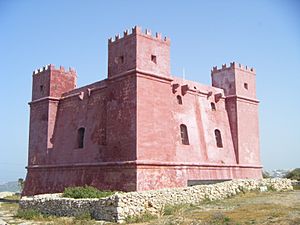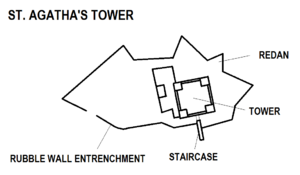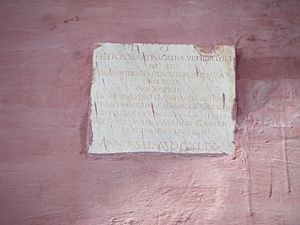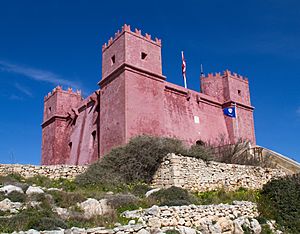Saint Agatha's Tower facts for kids
Quick facts for kids Saint Agatha's Tower |
|
|---|---|
| Torri ta' Sant'Agata | |
| Part of the Lascaris towers | |
| Mellieħa, Malta | |

Northwest corner of St. Agatha's Tower
|
|

Map of St. Agatha's Tower and the surrounding entrenchment
|
|
| Coordinates | 35°58′28.8″N 14°20′34.7″E / 35.974667°N 14.342972°E |
| Type | Bastioned watchtower |
| Site information | |
| Owner | Government of Malta |
| Controlled by | Din l-Art Ħelwa |
| Open to the public |
Yes |
| Condition | Intact |
| Site history | |
| Built | 1647–1649 |
| Built by | Order of Saint John |
| In use | 1649–20th century |
| Materials | Limestone |
Saint Agatha's Tower, also known as the Red Tower, is a large watchtower in Mellieħa, Malta. People also call it the Mellieħa Tower or Fort Saint Agatha. It was built a long time ago, between 1647 and 1649. This tower was the sixth of the Lascaris towers to be built.
The design of Saint Agatha's Tower is quite special. It looks different from other Lascaris towers. Instead, it is similar to the older Wignacourt towers. This tower was the very last large tower with strong defenses built in Malta.
Contents
Discovering Saint Agatha's Tower: History and Design
Saint Agatha's Tower was built by the Order of Saint John. Construction started in November 1647 and finished in April 1649. An architect named Antonio Garsin designed it. The tower has a square shape with four smaller towers at each corner.
How the Tower Was Built
The corner towers have special openings for cannons. These cannons could fire in many directions. They protected the base of the walls and the main entrance. The main tower also had large openings for cannons. The outer walls are super thick, about four meters (13 feet) at the bottom. The inside of the tower has a strong, rounded roof. The small corner towers have unique "fish tail" shaped tops. There was even a small chapel inside the tower.
Why the Tower Was Important
The tower stands on top of Marfa Ridge. This spot is very high up in the northwest of Malta. From here, guards could see the Mellieħa Bay. This bay was a possible landing spot for enemies. The tower also offered clear views of Comino and Gozo. It could also see other watchtowers along Malta's north coast. These towers connected it to the Knights' main base in Valletta.
Saint Agatha's Tower was the main stronghold for the Knights in western Malta. About 30 soldiers lived there. They had enough ammunition and supplies to last 40 days if they were under attack. Other forts in northern Malta, like Aħrax Tower, also stored their ammunition here.
Upgrades Over Time
Like many old forts, Saint Agatha's Tower was made even stronger in the early 1700s. A low stone wall was built around the tower's sides. This wall helped protect the tower even more. Because of this wall, the tower also worked like a small fort, called a redoubt. This was similar to the one at Żabbar during the French blockade.
The tower kept its military role during the British period. Soldiers used it during both World War I and World War II. Later, the Armed Forces of Malta used it as a radar station.
Saint Agatha's Tower Today: Restoration and Visitors
By the late 1900s, Saint Agatha's Tower was in bad shape. One of its corner towers was completely gone. Another was badly damaged. Luckily, a group called Din l-Art Ħelwa decided to restore it. They started in 1999 and finished in 2001. Many companies helped pay for the work.
Bringing the Tower Back to Life
During the restoration, the damaged corner towers were rebuilt. The walls and roof were fixed. Any worn-out stones were replaced. Inside, the walls were cleaned and painted. The original floor was uncovered. The stairs leading to the roof were also rebuilt. The floor inside was very uneven. So, a new wooden floor was put over it. This new floor has glass parts, so you can still see the old stones underneath.
Today, Din l-Art Ħelwa still takes care of the tower. It is open for everyone to visit. In 2015, the tower even won an award from TripAdvisor.
See also
 In Spanish: Torre de Santa Águeda para niños
In Spanish: Torre de Santa Águeda para niños
 | Charles R. Drew |
 | Benjamin Banneker |
 | Jane C. Wright |
 | Roger Arliner Young |



